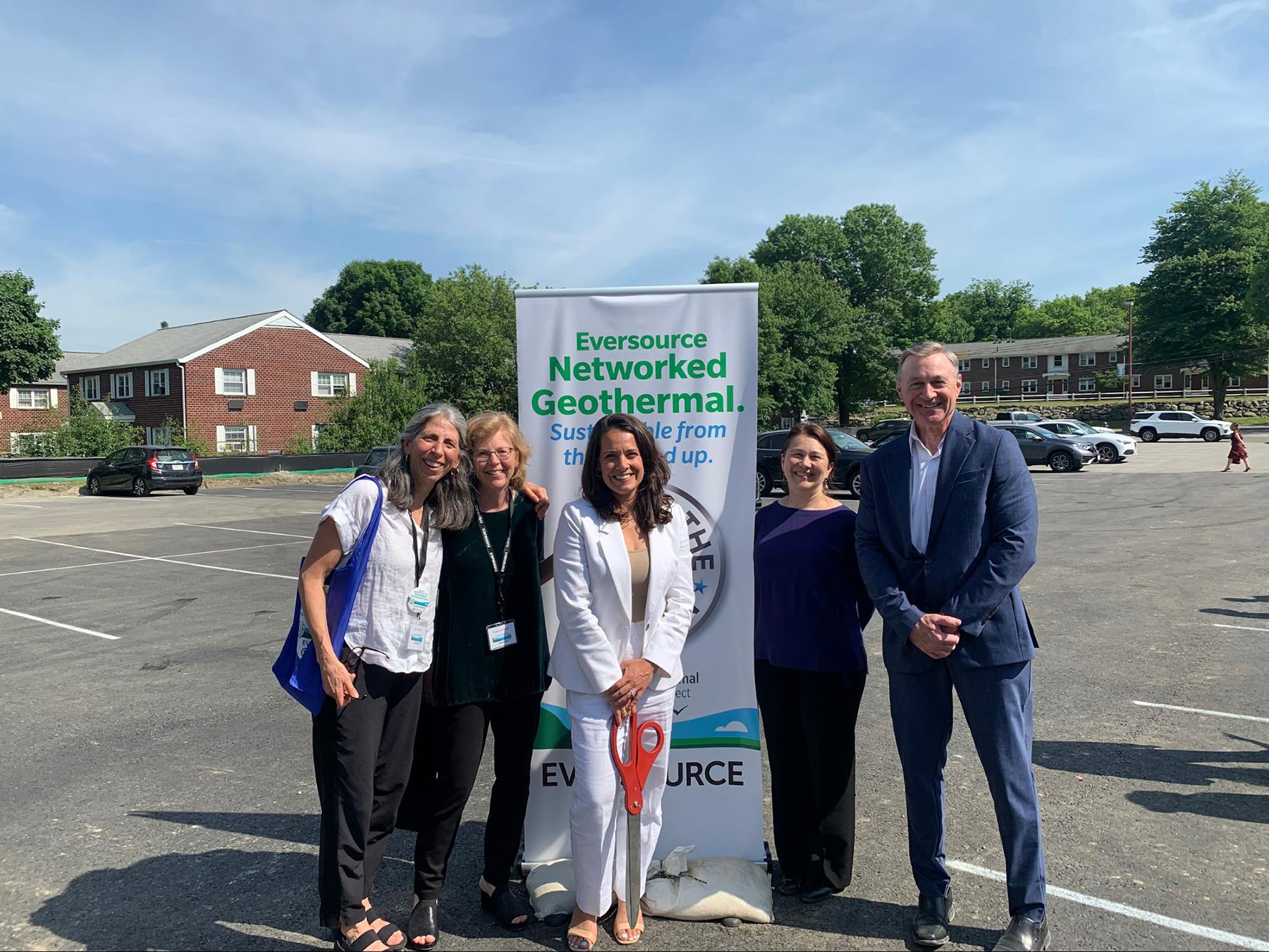
Left to right: Ania Camargo (Senior Manager of Thermal Energy Networks, BDC), Audrey Schulman (Executive Director, HEETLabs), Nikki Bruno (Vice President for Clean Technologies, Eversource) Zeyneb Magavi (Executive Director, HEET) and William Ackley (President of Gas Operations, Eversource). Not pictured: the infrastructure of the complete networked geothermal system, which is working quietly belowground.
Media Contact:
Jess Silber-Byrne
Thermal Energy Networks Communications Manager
jsilberbyrne@buildingdecarb.org
(203) 644-3324
Building Decarbonization Coalition Celebrates the Launch of the Nation’s First Utility-Owned Geothermal Network
Innovative Utility-Owned Geothermal Network Model Provides Affordable, Sustainable Heating And Cooling For Eversource Customers, Accelerates State Climate Goals
Framingham, MA – The Building Decarbonization Coalition congratulates Eversource, HEET, and the City of Framingham on launching the nation’s first utility-owned networked geothermal system. Beginning today, this geothermal network will provide clean heating and cooling to 96 affordable housing apartments, a fire station, a community college, and private homes and businesses in a neighborhood of Framingham, Massachusetts.
Thermal energy networks (TENs) heat and cool buildings by transferring thermal energy through water-filled pipes that connect to ground-source heat pumps. Geothermal networks are a particularly efficient type of TEN: by using boreholes as a thermal “battery,” these networks gain an earth-assisted boost of even greater efficiency and reduce the need for electric grid expansion.
Ania Camargo, Thermal Energy Networks Senior Manager at the Building Decarbonization Coalition, shared: “Today marks the beginning of a new era in affordable, efficient, and clean heating and cooling. Thermal energy networks provide a pathway to decarbonize homes and buildings at a neighborhood scale. We share the excitement of Framingham’s residents on their new, comfortable, healthy home heating and cooling systems, and congratulate HEET and Eversource on their collaborative achievement. Eversource has shown leadership in demonstrating the potential of utility-owned TENs, particularly in an environmental justice community, and we applaud their sustained engagement efforts to ensure customer enthusiasm during this transition. We encourage utilities nationwide to follow this example for equitable, affordable heating and cooling.”
TENs offer a path for utility companies and their workers to phase out methane gas infrastructure safely and responsibly, while migrating entire blocks to non-emitting heating and cooling—a particularly urgent objective in Massachusetts, where utilities must comply with state climate laws.
HEET first proposed the concept of utility-operated geothermal networks in 2017. Their promising feasibility study, conducted with Buro Happold Engineering, followed in 2019. This prompted Eversource to seek permission from the Department of Public Utilities to demonstrate the viability of geothermal networks in its territory. After a competitive selection process, Framingham was chosen as the demonstration site, and construction began in 2023.
Following today’s launch, Eversource and HEET will join a research team funded by the Commonwealth of Massachusetts to collect data on outcomes such as cost, smoothness of operation, customer satisfaction, and emissions reductions. Key data and lessons will be shared with other states and utilities to advance the rapid adoption of geothermal networks across the country. Follow the progress of nationwide pilots and ongoing data collection by subscribing to our newsletter.
###
ABOUT THE BUILDING DECARBONIZATION COALITION
The Building Decarbonization Coalition (BDC) unites stakeholders on a path to transform the nation’s buildings through clean energy, using policy, research, market development and public engagement. The BDC and its members are charting the course to eliminate fossil fuels in buildings to improve people’s health, cut climate and air pollution, prioritize high-road jobs, and ensure that our communities are more resilient to the impacts of climate change. Learn more at www.buildingdecarb.org
